Extract from The Guardian
Australia east coast floods 2022
In Lismore the floods have drowned our homes, lives and futures under a sea of mud – what is our government doing?
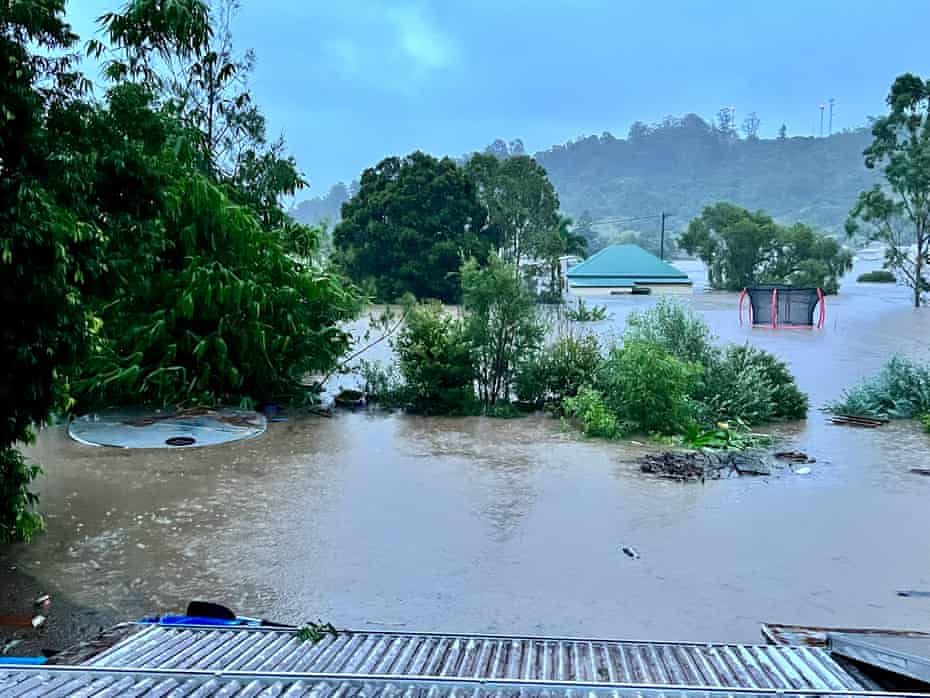
‘We don’t know where to start. It is too overwhelming, not just what we have to deal with here, but the whole situation; our neighbours, our destroyed town’.
At least it is still standing. Everything is brown. Muddy waters and debris block our way so we grab some washed-up scaffolding and wood to make a bridge to cross the water-filled ditch over the back of the disused rail line. My partner, his friend, my eight-year-old son and I cross the bridge crab-style, then climb over the railway tracks and through more muddy water into the backyard.
The smell is horrendous. It’s a mix of rotting rubbish, diesel, dust and mud. The sky is a piercing blue, an ironically beautiful day after such a cataclysmic event. We are grateful for the sun after such relentless rain but the stunning blue against the muddy landscape is jarring.
I wonder what is happening in Ukraine. I had heard in passing that Vladimir Putin might press the button. As if my brain can contemplate that right now. Before the floods I was engaged in the geopolitics of the Russian invasion but now the war is in my backyard.
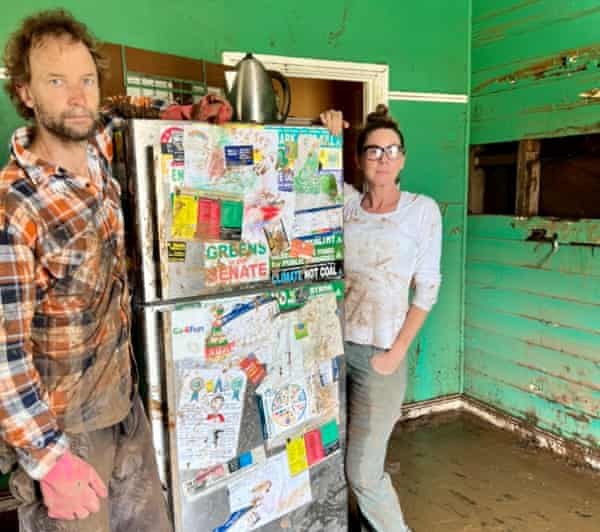
Adam Guise (L ) and Eddie Lloyd (R) with the damaged fridge at Adam’s flooded out home in Lismore. Photograph: Eddie Lloyd
That is the only way to describe the scene here. Sometimes you can’t even have a conversation because of the noise of the helicopter overhead, still rescuing people three days later. All around are brown mud, dust, broken buildings and scattered possessions strewn and piled across the landscape. But it’s the putrid smell that overwhelms every sense and we know it will grow in intensity as the hot day ferments the rotting detritus and vegetation.
We get to the front yard and up the muddy steps to the porch. The smell is so intense I nearly vomit. The porch freezer is upturned and its contents are rotting. We go inside. We can’t even get into one of the rooms as the door is jammed. Every piece of furniture, drawer, cupboard, fridge, washing machine and belonging has been strewn about the house.
Then we hear the squeaks. My partner races in, frantically climbing over the upturned furniture and bed and there is Prince, our beautiful long-haired guinea pig. Alive, along with his harem of girls. This small mercy breaks us. We thought all the animals were dead. Somehow the guinea pigs survived, floating to the ceiling in their tubs which didn’t capsize despite the 15m flood height.
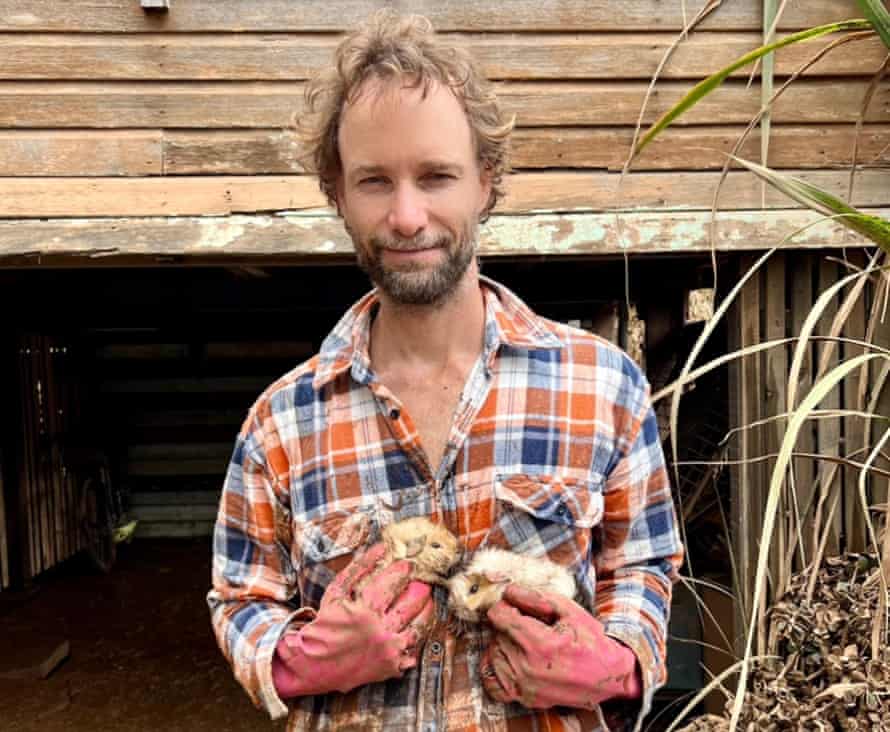
‘We thought all the animals were dead.’ Adam Guise with the guinea pigs that survived the flooding. Photograph: Eddie Lloyd
Back out in the glaring sun, we don’t know where to start. It is too overwhelming, not just what we have to deal with here, but the whole situation; our neighbours, our destroyed town, the reality of a house washed against the bridge. I think of the lady who was clinging for her life to the window of her house and wonder whether she made it out alive. The police don’t want us in the city centre today as they pull out bodies.
We were lucky we didn’t die. I called the State Emergency Service at 6am on Monday morning after climbing to our attic to wait out the flood. But the waters kept rising. After seven hours of waiting to be rescued, we hailed a passing tinnie driven by a local, Sandro – an unknown neighbour over the railway line.
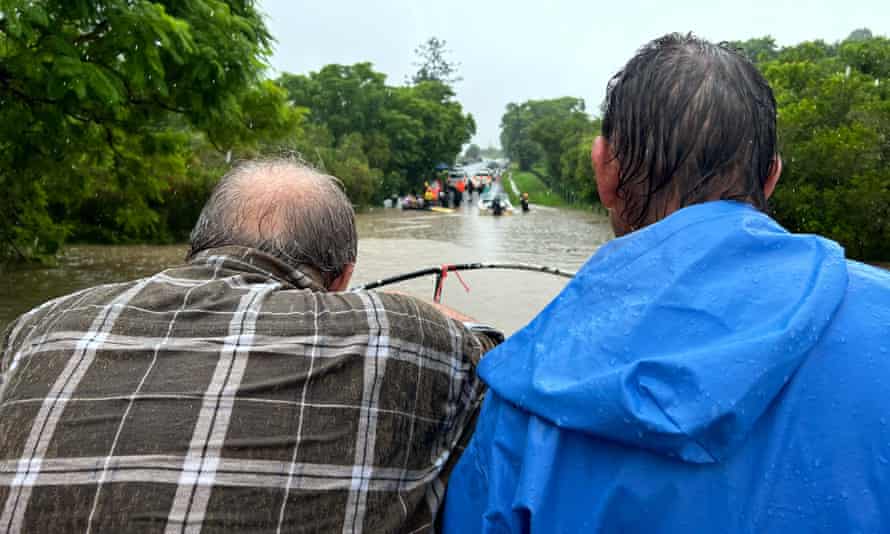
Eddie Lloyd and Adam Guise being rescued in a boat by Sandro. Photograph: Eddie Lloyd
We drive through Lismore’s central business district – it looks as though it has been bombed. Business owners are piling everything on to the street to make way for the rubbish collection that will last for weeks and resemble a post-apocalyptic horror film.
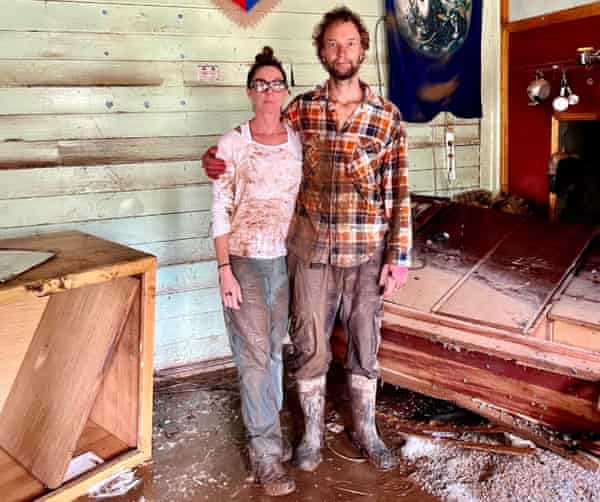
Many won’t recover from this. Businesses are saddled with debt from the last flood and the preceding two years of Covid lockdowns; it’s too much to bear. My partner cried for months after the 2017 flood, seeing the damage done to our much-loved town but this time we are numb to it. My son is in shock, going quiet at the state of his beloved CBD and then crying for hours as he tries to come to terms with it and the fact that his school is gone and closed indefinitely.
Until the pandemic created insane house prices, Lismore was an affordable place to live. North Lismore, being on the floodplain and victim of the CBD levy rather than a beneficiary, was the most affordable and is home to some of the most endearing, as well as the most vulnerable, members of our community. For almost everyone on the floodplain, flood insurance is a near impossibility, with premiums close to $30,000 a year. Despite people spending more than $100,000 to raise their homes above the nominal one-in-100-year flood height, this flood exceeded such levels by more than 2m. For many people in North Lismore, this meant more than 5m of water on the ground, drowning homes, lives and people’s futures under a sea of mud.
We are at the threshold of climate catastrophe and it’s communities like ours that are bearing the brunt of it. It has not just lapped at our doorstep, it smashed right through our doors. It has destroyed our CBD and our loved ones have drowned to death. These climate catastrophes are going to happen more frequently, with more intensity, more damage and more deaths, and we will see more communities collapsing.
Back at the frontline of the climate crisis, we set up a wash station. Our neighbours, drenched in muddy water, come by. Their boat capsized and they lost their phones and laptops to the dreaded waters. We hug, adrenaline and shock pulsing through our veins, preventing tears from forming. More rain is coming. Maybe it’ll wash some of the dirt off the house, we say. No, no more rain. Please. I see I have missed a call. I listen to the message, it’s the SES. Do we still need to be rescued?
As I write this, fuel has run out, our water is about to run out and the one supermarket left has no food on its shelves. What is our government doing?
No comments:
Post a Comment